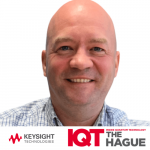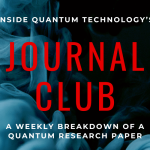Quantum News Briefs: March 22, 2024: CalTech Researchers Create New Method that Uses Classical Computers to Check Accuracy of Complex Quantum Systems; First-of-Its-Kind ‘Quantum Tornado’ Mimics Black Hole Dynamics; “From Six Figures to Seven: 3 Quantum Computing Stocks Set to Make Millionaires”

Quantum News Briefs: March 22, 2024:
CalTech Researchers Create New Method that Uses Classical Computers to Check Accuracy of Complex Quantum Systems

Caltech researchers have made a significant stride towards understanding and mitigating the errors inherent in quantum computing, which remains a considerable challenge in leveraging its potential to outperform classical computers across various fields. They’ve developed a method allowing classical computers to estimate the error rates in quantum systems without needing full simulation, a task increasingly impractical as quantum complexity grows. This approach, detailed in Nature, uses a quantum simulator with 60 qubits—far beyond the traditional simulation capabilities—to experimentally analyze error rates through a novel technique that simulates quantum computations with varying degrees of entanglement. This method, like painting with progressively finer brushes, has demonstrated an error rate of 91 percent, improving the field and providing a new benchmark for quantum computing’s progress. This breakthrough advances our understanding of quantum errors and enhances the capacity to measure and improve quantum computing performance.
First-of-Its-Kind ‘Quantum Tornado’ Mimics Black Hole Dynamics
 Physicists at the University of Nottingham have leveraged a superfluid helium vortex to gain novel insights into the behavior of black holes, revealing the potential for groundbreaking advancements in our understanding of these enigmatic cosmic phenomena. By cooling helium-4 to just above absolute zero, the team created a “quantum tornado” that mimics the gravitational pull of black holes with unparalleled precision. This experimental setup allowed them to observe tiny surface waves and their interactions within the superfluid. It offers a unique perspective on how black holes might influence the space-time fabric surrounding them. The findings, published in Nature, mark a significant leap from previous experiments, moving closer to predicting how quantum fields behave in the curved spacetimes around astrophysical black holes. This research sheds light on the elusive nature of black holes and sets a new benchmark for simulating their effects in a controlled laboratory environment.
Physicists at the University of Nottingham have leveraged a superfluid helium vortex to gain novel insights into the behavior of black holes, revealing the potential for groundbreaking advancements in our understanding of these enigmatic cosmic phenomena. By cooling helium-4 to just above absolute zero, the team created a “quantum tornado” that mimics the gravitational pull of black holes with unparalleled precision. This experimental setup allowed them to observe tiny surface waves and their interactions within the superfluid. It offers a unique perspective on how black holes might influence the space-time fabric surrounding them. The findings, published in Nature, mark a significant leap from previous experiments, moving closer to predicting how quantum fields behave in the curved spacetimes around astrophysical black holes. This research sheds light on the elusive nature of black holes and sets a new benchmark for simulating their effects in a controlled laboratory environment.
In Other News: Investor Place article: “From Six Figures to Seven: 3 Quantum Computing Stocks Set to Make Millionaires”
![]()
The burgeoning field of quantum computing is heralded for its potential to revolutionize industries by significantly enhancing processing capabilities and reducing energy consumption. It is witnessing a surge in interest and investment, highlights a recent Investor Place article. With a market poised for explosive growth, from $713.4 million in 2022 to an anticipated $6.5 billion by 2028, companies like Honeywell International, Arqit Quantum, and IonQ are at the forefront, each with unique strategies to harness this disruptive technology. With its powerful quantum computer and strategic partnership with Microsoft’s Azure Quantum, Honeywell has raised significant capital for its venture Quantinuum, aiming to leverage quantum advancements in various sectors. Arqit Quantum, focusing on quantum encryption services, represents a speculative but potentially high-reward investment, banking on the increasing importance of secure communications. IonQ, diversifying its revenue streams through hardware, software, and service offerings, stands out for its commercial progress in making quantum computing accessible. Amidst this quantum computing gold rush, investors are eyeing these stocks as potential gateways to significant returns, mirroring the early days of Bitcoin’s remarkable ascent.





















